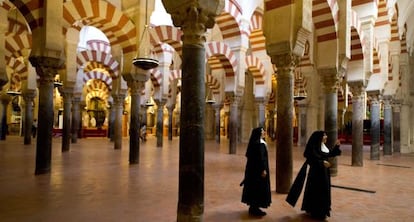Church must return Córdoba mosque to public domain, say ex-mayors
Former officials call for inventory of all properties “illegally” appropriated by diocese

Five former mayors from Córdoba have demanded an explanation as to why the Catholic diocese was allowed to register the Mosque-Cathedral of Córdoba as a property holding on the city’s registry.
In a letter released Wednesday, the mayors said they were “deeply concerned” about the Church’s takeover of the mosque and cathedral complex, which were both declared a UNESCO World Heritage Site in 1984.
“We demand legal restitution and the public deed of the Mosque-Cathedral of Córdoba, as well as the return to the public domain of all heritage property that was illegally registered by the Church,” they wrote.
The letter was signed by Julio Anguita, Herminio Trigo, Manuel Pérez, Rosa Aguilar and Andrés Ocaña, who all served as mayors under the United Left (IU) coalition. Trigo and Aguilar are now Socialist Party members.
The controversy was sparked in 2006 when the Catholic Church registered the mosque and the cathedral complex as one entity with the property registrar’s office. The move set off a battle waged by a group of citizens who, in 2013, formed a platform to demand that the Church relinquish ownership and management of the site. A petition drive initiated on the internet collected some 80,000 names. The bishopric stands accused of trying to wipe out the traces of the building’s Islamic past, having removed the word “mosque” from leaflets and posters.
Built as a mosque in 987, the site was converted into a Catholic cathedral in 1236. It remains one of the Andalusian city’s biggest tourist attractions, reflecting Spain’s Christian and Islamic past.
A series of laws passed during the Franco regime and then modified under the conservative government of José María Aznar (1996-2004) allowed the diocese to register properties under the Church’s name.
But the mayors said that there are constitutional questions regarding the law.
We know the PP’s position: they are always defending the church”
The current mayor of Córdoba, José Antonio Nieto of the Popular Party (PP), didn’t sign the letter.
“We know the PP’s position on this matter: they are always defending the Church’s position. We didn’t think it was necessary for us to go through the motions so that they could just reject signing it,” explained Trigo.
Besides the mosque-cathedral, the former mayors also refer to the 18th-century Triumph of St. Rafael monument and the surrounding square, which were registered under the diocese’s name in 2011. Last year, the municipal’s legal advisors concluded that the square and the monument do not belong to the city.
But the mayors maintain that there is enough evidence and historical records in the municipal archives that show that the city had claimed ownership and tried to “prevent the Church from appropriating the property.”
Some months back, City Hall announced that it would take an inventory of all the property in the municipality’s hands and determine whether the Church has actually registered properties from the public domain.
The mayors, however, want city lawmakers to go further: they want a complete list of all the properties that the diocese has claimed for itself in order to clear up the situation.
The mosque, “a monument of universal dimension,” as well as “hundreds of other properties in public domain, were registered under a law – which may not be constitutional – that gives the Church the privilege to register buildings and tracts of land without providing a deed for the property,” the mayors said.
They accused the Church of acting as a public administrator, and its diocese members for taking on the roles of notaries.
The former mayors also explained why they are now sending the letter: “We decided to act responsibly. The letter is a summary of the views that have been expressed separately by each of us and we felt it was necessary to make it public,” explained Trigo, who succeeded Anguita in office. “Manuel and I wrote a draft, showed it to our colleagues, who reviewed and signed it.”
Removal of a name
The fight for the property rights to the historic Córdoba mosque has reached unimaginable heights. What was a local battle has now become an international dispute that has been covered by the world press, thanks to the Church’s attempts to minimize the building’s Islamic past, by reducing the use of the word “mosque.”
“We especially express our concerns for the city council’s actions in relation to the Córdoba mosque, a masterpiece of Islamic art in Europe, and its decision to omit its Andalusian roots in brochures, posters, entrance tickets, audiovisual material and on the web,” the mayors said.
But the council argued that the name mosque appears 23 times on its website and six times in official brochures. Moreover, with respect to the ownership, the council stated that “all international and national legislation supports that the Catholic Church has owned the temple since 1236.”
For its part, the Church stated that it only registered the mosque in 2006 “to give publicity to the ownership of a property that it already owned.”
“Registration does not imply in any way a change of ownership or a purchase; it is simply a notice in the property registry,” the Church stated.







































